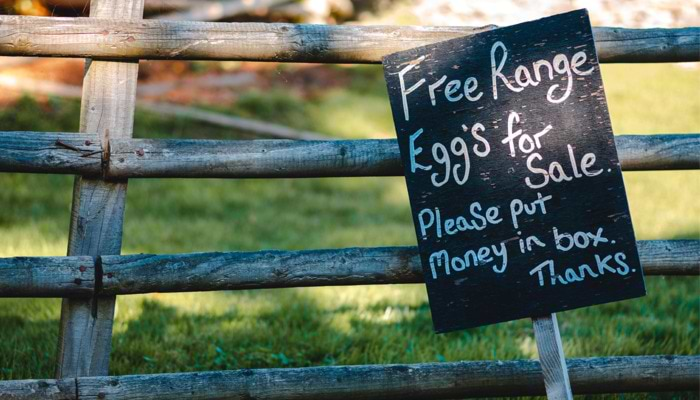
© Piranhi / Shutterstock.com
In today's challenging economic climate, just about everyone is looking for ways of making some extra money. Have you ever thought about how to make money from a smallholding? Not only is it a rewarding activity; it's also environmentally friendly to manage your own land.
If you give it some thought, you'll benefit in many ways, financially and in terms of sustainability. Plenty of people love local produce for different reasons, from the "green" ethos to the health benefits.
Some people will buy from a smallholding just to support a local business. They know the produce is fresh and can be in their home literally an hour after being harvested.
Fresh food
First of all, before you start selling any food products, you should check the local regulations in your area. They can vary from county to county, so your first port of call should be the local authority. Don't risk breaking any bylaws, which could land you in trouble.
The easiest edibles to sell are fruit and vegetables, which you can sell at your local farmers' market. There are lots of fresh foods you can grow on a smallholding such as carrots, tomatoes, marrows, broad beans, peppers, courgettes, lettuce, radish, shallots, spinach, mushrooms and potatoes.
You could also start a herb garden to sell fresh herbs at the farmers' market and dried herbs online. Grow fruit to sell at the market too. Keep it simple - such as growing apples, pears, strawberries and berry bushes.
You could set up a stall at your garden gate to sell your produce every day. Again, check with the local authority what is permitted by the local bylaws.
Livestock
People always want to buy farm-fresh eggs, so keep chickens and you'll always have a supply to sell. When you buy a chicken coop and hens, do your research first, so you know what you're getting into. Keeping living creatures is more challenging than growing veg.
If you feel confident enough, buy goats or a cow, as this opens up a whole new enterprise. Not only could you sell milk, but you could also try your hand at making cheese and other homemade dairy products.
When it comes to livestock, it is even more important to check the local regulations, so you know what you're permitted to keep on your land.
Homemade products
Go a step further than simply growing produce and make some home baked items such as cakes, biscuits and pies, both savoury and sweet. These are great to sell fresh at markets. You could also sell homemade jams, preserves and jellies.
Many people are lucky enough to have an abundance of wild blackberries growing on their land. These make fantastic jam.
Make chutney from your leftover vegetables. You can even use tomatoes that haven't ripened to make a green tomato chutney. Look online for ideas and recipes. The possibilities are endless.
Raising awareness
Once you've done the hard part and decided what you're going to grow, or whether you're having livestock as well, it's time to come up with some marketing ideas. This is an important part of your success. You may have the best produce in the area, but if nobody knows about it, then it's not going to sell.
The easiest and cheapest way of raising awareness of your goods is by promoting your products online through social media. On sites such as Facebook, it’s easy to set up a page with details of your enterprise, some photos of your produce and wares and information on how to buy them.
As well as selling at farmers' markets, you could offer a local delivery service, either incorporating the transport costs into your prices in general or setting a delivery charge.
If you're confident in your abilities to produce a regular supply of fresh food, eggs and other products, you could try selling to local independent shops. Once you get your foot in the door, you could be on the way to starting your own small business.





